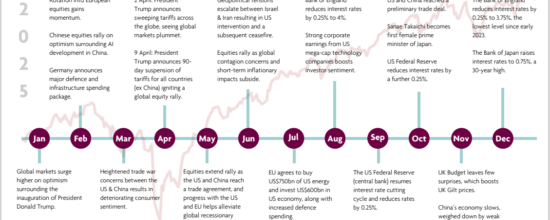Fed rate sends stock markets to new highs
To download our market update in PDF click here
Share prices surged around the world after the US Federal Reserve slashed its benchmark interest rate
Global stock markets rallied to new record highs after the US Federal Reserve (Fed) cut interest rates for the first time since 2020 by half a percentage point to a range between 4.75% and 5%. With signs that inflation is fading and the labour market is weakening, policymakers said rates could fall further this year.
The post-pandemic spike in price rises has eased further, with US consumer inflation falling to 2.5% in August. Core inflation, which excludes volatile food and energy prices, held steady at 3.2%. US employers added 142,000 jobs, less than the roughly 160,000 analysts had forecast. However, the unemployment rate fell to 4.2% from 4.3% in July. US economic growth for the second quarter was upgraded to 3%, fuelled by strong consumer spending and business investment.
Bank of England holds interest rates
The Bank of England held interest rates at 5% after the latest UK inflation figures held steady. While the Bank decided not to lower borrowing costs, its governor Andrew Bailey said interest rates could be cut “gradually over time” if inflation stays low.
UK inflation remained at 2.2% in August, but services inflation rose to 5.6% from 5.2% in July. Meanwhile, core inflation came in at 3.6%, from 3.3% in July. The UK economy failed to grow in July for the second successive month in a blow to the new Labour government, which has made boosting growth one of its priorities. Consumer confidence has also fallen over concerns about the Autumn Budget
Euro area business activity falls
Business activity in the euro area declined for the first time in seven months in September, as the bloc’s dominant services industry flatlined, while a downturn in manufacturing accelerated. Activity in France is sluggish, mirroring Germany, where the downturn accelerated to its steepest rate since February. Meanwhile, the rest of the region experienced growth, though the expansion was modest and the slowest recorded since January.
The European Central Bank (ECB) cut interest rates by a quarter percentage point to 3.5%, proving further relief to households and businesses. Inflation has fallen to 2.2% across the region, bolstering expectations of further rate cuts.
Asian stocks rally
Chinese stocks soared after Beijing rolled out further stimulus measures to arrest a slowdown in the economy. In an attempt to
boost the flagging economy, China’s central bank announced plans to lower borrowing costs and allow banks to increase their lending. China’s youth unemployment rate has risen to a fresh high since new records began in December, driven by restrictive hiring practices and a struggling economy. There has also been a slowdown in retail sales and industrial production. After a stronger than expected start to the year, China’s economy is struggling with a real estate downturn, slowing consumer spending and rising trade tensions.



